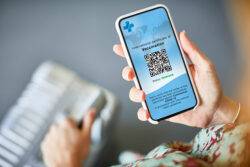Do you still need your Covid passport to travel? (Picture: Getty Images)
It seems hard to believe that just a couple of years ago most travel around the world was restricted in the wake of the Covid pandemic – with many countries laying down strict entry requirements to prevent the spread of the virus – and others closed to travellers completely.
While the virus continues to circulate, most aspects of life have now returned to normal, among them foreign travel – with most countries having re-opened their borders to visitors irrespective of their vaccination status.
The US recently lifted its final restrictions on travel, allowing unvaccinated passengers to enter the country as of May 12.
Prior to this those who had not had a Covid jab could only enter the US if they were a US citizen, national, or lawful permanent resident, or were exempt – but that has now changed.
The US is now expecting a surge in travel as people who were previously banned from entering the country can now do so – but with their rules now lifted, do any other countries still have Covid restrictions at the border?
Here’s what you need to know…
Which countries still have Covid travel restrictions?
As it stands, there are a handful of countries that still have some Covid travel restrictions in place.
Chief among these is China, where the first cases of the virus were confirmed in late 2019 before it spread around the world.
While Chinese citizens are now allowed to travel abroad, the country is still largely closed off to tourists and other foreign visitors.
Most travel has now resumed across the world (Picture: Getty Images)
Anyone who is arriving from abroad for other purposes, such as for work or to visit family, needs to provide proof of a negative PCR test taken within 48 hours of travel. It’s also possibly you may be tested again on arrival.
Hong Kong however, is open to visitors, and you do not need to show proof of vaccination or a negative test to enter.
Brazil also has some restrictions still in place, with unvaccinated travellers having to show proof of a negative Covid test taken within 24 hours of flying. Vaccinated travellers should also make sure they have proof with them, as according to the Foreign Office it may be needed to enter venues including gyms and restaurants.
A handful of other countries still have some rules in place.
To view this video please enable JavaScript, and consider upgrading to a web
browser that
supports HTML5
video
Niger requires passengers to show proof of vaccination, while unjabbed passengers will need to present a negative PCR test taken within 72 hours of travel, as well as quarantine for seven days.
East Timor requires vaccinated passengers to show proof of their jabs, while unvaccinated travellers are required to quarantine for 10 days unless they are unable to have the vaccine for medical reasons, in which case they must present a letter from their doctor.
Tuvalu also requires passengers to produce a negative test on arrival and quarantine for seven days, even if they have been fully vaccinated.
Some countries still require unjabbed travellers to take a test (Picture: Getty Images)
Guinea-Bissau is another country which requires unvaccinated visitors to supply a negative test taken within 72 hours of arrival. You will also have to take one within 72 hours of leaving, and may be tested again if you display any Covid symptoms upon entry.
A number of other countries require unvaccinated visitors to supply a negative test result upon entry. These include Angola, Bangladesh, Cameroon, Chad, Bolivia, Comoros, Democratic Republic Of Congo, Djibouti, Ghana, Malawi, Philippines, Sao Tome and Principe and South Sudan.
The following countries are still closed to unvaccinated travellers except in exceptional circumstances:
Federated States Of Micronesia
Liberia
Marshall Islands
Nauru
Pakistan
Palau
Solomon Islands
Indonesia
Tuvalu
Things to remember
While restrictions around the world have largely been lifted, regardless of vaccination status, you should remember that Covid is still in general circulation and the situation could change in any given country at any time, should there be a new wave of cases.
Remember the rules could change at any time (Picture: Getty Images)
You should always check the status of any country you plan to travel to before you do so, in case the requirements for entry have changed.
Remember also that while you are abroad you are subject to the rules and regulations of that country if you do test positive – this could include having to self-isolate until you have a negative test result.
Before jetting off anywhere you should make sure you have a plan in place in case you do test positive, and need to extend your stay.
You should also make sure you have up-to-date travel insurance with Covid cover (which now comes as standard with many policies), so that you are covered if you do need to stay for longer, or if you become unwell and require hospital treatment.
MORE : This year’s GCSE and A Level pupils will start having Covid support removed
Follow Metro across our social channels, on Facebook, Twitter and Instagram
Share your views in the comments below
Travel is mostly back to normal.





